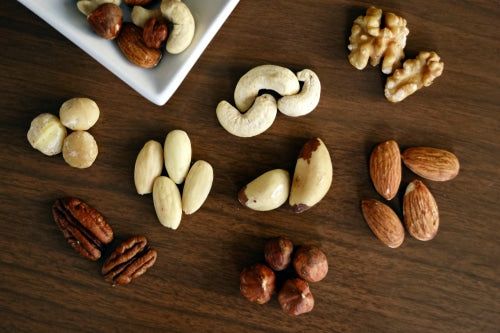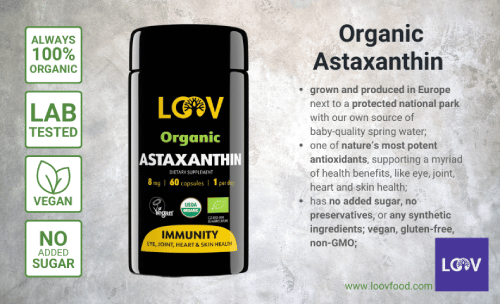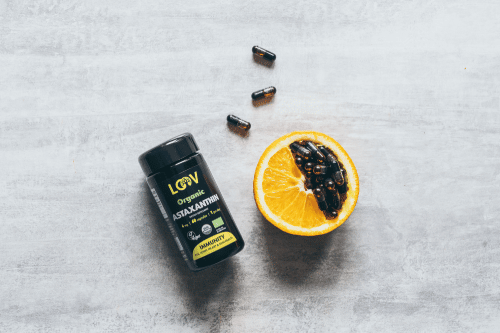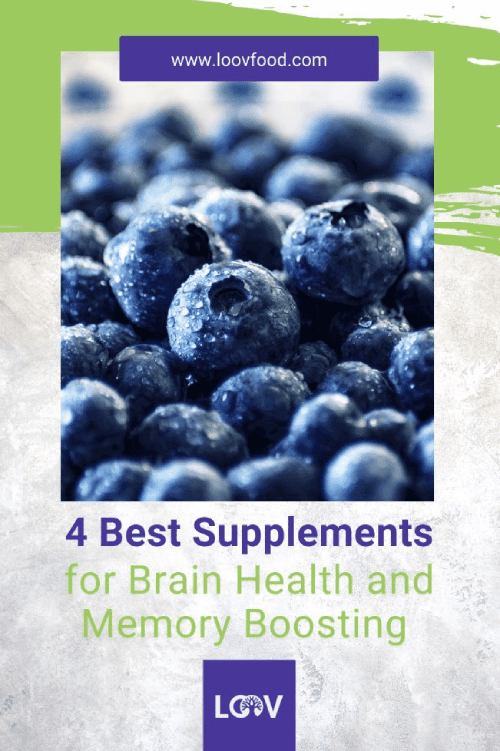Aren’t you glad that you don’t live in ancient times when headache treatment involved drilling holes in the skull? We certainly are.
More importantly, the strides made in brain function research and how food impacts the brain have opened up valuable paths to treating, regenerating, and protecting the brain.
Table of Contents
1. How Astaxanthin Boosts Memory
2. How Omega-3s Regulate Mental Processes
3. How Zinc Supports Growth and Learning
4. How B Vitamins Give the Brain an Energy Kick
5. Support Your Brain With a Healthy Diet
Whether you don’t feel as mentally fit as you used to or you want to get a jump on boosting your brain health, you’ll benefit from learning which supplements are best for brain health and memory.
You’ll learn how these supplements can:
- Help generate new brain matter
- Protect the brain from inflammatory damage
- Regulate and enhance signals in the brain and memory formation
- Contribute to the building and regeneration of key brain chemicals and structures
1. How Astaxanthin Boosts Memory
One of the most important structures for memory, the hippocampus, looks like a seahorse.
It’s serendipitous that memory and connection go hand-in-hand—from the same habitat as the seahorse, aquatic micro-algae produce one of the strongest antioxidants ever, astaxanthin, which enhances hippocampal health.
Fun aquatic facts aside, how does astaxanthin actually help the hippocampus and boost memory?
A study on efficacious natural supplements showed that astaxanthin supplementation:
- Enhanced adult hippocampal neurogenesis
- Increased spatial memory
So, ride the nerd train with us for a bit …
Neurogenesis is the growth of new cells. When the adult hippocampus grows new stronger cells, it protects your learning and memory centres from age and disease-related impairment.
Now let’s talk about spatial memory.
Spatial memory enables you to find your way around an environment and to remember where things are. It’s essential for basic survival but also for modern living situations, like navigating a website or remembering where you parked your car.
It follows that cognitive disorders, usually feature spatial memory loss and wandering as defining factors.
Now here’s where it gets interesting. The same study on astaxanthin found that the growth of new brain cells also improved spatial memory, which is essential for consciously remembering personal experiences.
We’ve previously discussed the inflammation-fighting benefits of astaxanthin. The superior free-radical-scavenging capacity of astaxanthin also benefits brain health in several ways.
Various studies have shown that astaxanthin may boost brain health and potentially prevent brain degenerative diseases by:
- Improving the antioxidant status of blood cells, which may contribute to the prevention of cognitive decline.
- Reducing the release of chemicals that promote inflammation in the brain, thus protecting brain cells
- Suppressing nerve cell death associated with conditions such as Parkinson’s disease
- Protecting and aiding in the recovery of nerve cells damaged by impairment of blood supply to the brain, for example after a cerebrovascular incident
- Rescuing motor nerve cells damaged by oxidative stress in neurodegenerative conditions
💡 Expert Tip:
Organic astaxanthin works best when allowed to accumulate in the body. To achieve that, we suggest a daily dose of 12 mg for two months, followed by a maintenance dose of 4 mg thereafter.
Astaxanthin is best assimilated in the presence of fats. Be sure to take it with a meal rich in healthy fats or immediately after.
Remember, the quality and purity of astaxanthin supplements will heavily impact how effective they are.
“I have switched to LOOV’s Astaxanthin supplement because of its purity, natural, not synthetic, organic, and the quality of the protected water where the micro-algae grows.”
— Camelia
2. How Omega-3s Regulate Mental Processes

Omega-3 polyunsaturated fatty acids are veteran nutrients, well-known for supporting heart health and boosting immunity.
In recent studies, their role in brain health is commanding more scientific interest—and with good reason.
Did you know that 20% of the brain’s dry weight comprises polyunsaturated fatty acids? Specifically, one of the omega-3 fats, known as DHA (docosahexaenoic acid), is a major component of nerve cells in the brain and nervous system.
So, apart from the structural component, how do omega-3s boost brain health and memory?
In the table below, we summarise the potential omega-3s have to improve various mechanisms that are crucial for brain health.
| Omega-3 action on body mechanisms | Benefit to the brain |
| Boosts glucose uptake | Provides a continuous energy source for the brain, which doesn’t store energy |
| Improves connection and signal transmission of chemical messengers in nerve cells | Ensures proper functioning of the brain from involuntary movements to learning and memory formation |
| Reduces inflammatory proteins in the brain | Protects the brain from damage caused by inflammation and oxidative stress, thus improving brain function |
| Improves insulin sensitivity in body fat cells | Insulin in the brain controls food intake and regulates cognitive functions, particularly memory |
| Regulates dopamine and serotonin signalling | They modulate the brain’s ability to change and adapt (plasticity). This specifically applies to executive function, decision-making, and reward-guided learning and memory processes |
The benefits of a diet rich in omega-3 fatty acids are undeniable.
In fact, a sample study found that when omega-3 was used to supplement therapy for mental health condition, there was an improvement in sleep disturbances and depressive symptoms.
💡 Expert Tip:
Omega-3s are better absorbed when taken with a high-fat meal because they are fat-soluble.
Avoid having coffee or tea after your omega-3 dose. These beverages speed up digestion, which limits the absorption time for essential fats.
3. How Zinc Supports Growth and Learning

We love sneaking nutrition into delicious treats, like our Berrylicious Raspberry Bliss Balls which contain almonds, cacao powder and dates—all sources of zinc.
Zinc is an essential mineral, meaning that even though your body can’t make or store it, it still needs zinc for basic functions, such as:
- Supporting and activating the various enzymes and factors that control new cell growth
- Activating antioxidant proteins and reducing the activity of pro-oxidant enzymes
- Modulating the development and function of your innate immunity
- Regulating how nerves keenly discriminate, process and transmit sensory information, which is essential to learning and memory
💡 Expert Tip:
An element of the modern diet that causes zinc deficiency is a high phytate consumption. Phytates reduce the bioavailability and absorption of zinc in the intestine. Phytates occur in wheat, whole grains, legumes, nuts, and seeds.
To optimise zinc absorption from plant sources, consider heating, sprouting, soaking, slow-cooking, and fermenting your nuts, seeds or grains before eating. After all, diet forms the basis of zinc supplementation.
4. How B Vitamins Give the Brain an Energy Kick

B vitamins are the water-soluble vitamins involved in every stage of the metabolic process, which breaks down glucose, fats and protein molecules to release energy.
Therefore, we can infer that B vitamins are essential to the brain because it consumes 20% of the body’s total energy expenditure.
That said, each of the B vitamins can cross the blood-brain barrier and has a specific function in the brain which we’ll break down in the table below.
| B vitamin | Brain-specific function |
| Thiamine (vitamin B1) | Contributes to the structure and function of nerve cell membranes
Modulates chemical messengers (neurotransmitters) in the brain |
| Riboflavin (vitamin B2) | Reduces neuroinflammatory response in the brain
Regulates electron transport, oxygen transfer and storage, which is essential to the production of blood cell proteins and other key enzymes |
| Niacin (vitamin B3) | Reduces disturbed sleep, especially in people with Parkinson’s disease
Protects the brain from oxidative stress Repairs DNA, thus reducing nerve cell death Regulates message transfer across nerve cells |
| Pantothenic Acid (vitamin B5) | Forms the base of a key enzyme that controls the production of chemical messengers and steroid hormones |
| Pyridoxine (vitamin B6) | Contributes to the production of neurotransmitters, like dopamine and serotonin, essential for learning, memory and sleep |
| Biotin (vitamin B7) | Regulates the uptake and breakdown of glucose, the brain’s primary source of energy |
| Folate (vitamin B9) and Cobalamin (vitamin B12) | Work together to convert proteins into key neurotransmitters, like dopamine and adrenaline |
The eight B vitamins are so crucial to brain function that people who suffer deficiencies in these vitamins can experience symptoms such as fatigue, personality change, memory loss, brain dysfunction and cognitive impairment.
💡 Expert Tip:
Vitamin B12 comes from bacteria. For those following a plant-derived diet, B12 can be hard to find in sufficient amounts since it otherwise naturally occurs in animal products.
Plant-derived sources of vitamin B12 include fortified foods, such as nutritional yeast, plant milks, breakfast cereals and some soy products.
Consult your doctor about any substances or medications you’re taking that could interfere with the absorption of B12, including excessive alcohol, medication for managing blood sugar levels, and immune system suppressants.
Support Your Brain With a Healthy Diet

To recap, inflammation is detrimental to brain function, therefore, any inflammation-fighting nutrients will support brain health. The supplements discussed above all have a strong antioxidant component. They also enhance the transmission of messages in the brain, which is crucial for learning and memory.
Remember that supplements are just that, supplementary. Take the reins of your brain health and memory by eating a colourful, balanced diet, exercising, sleeping well and reducing stress.
Lastly, the quality of ingredients in your supplements of choice is key to their effectiveness. If you’re ready to switch to clean, organic, free from genetically modified organisms, sustainably produced supplements, check out LOOV Food’s Organic Astaxanthin.
Share on Pinterest





